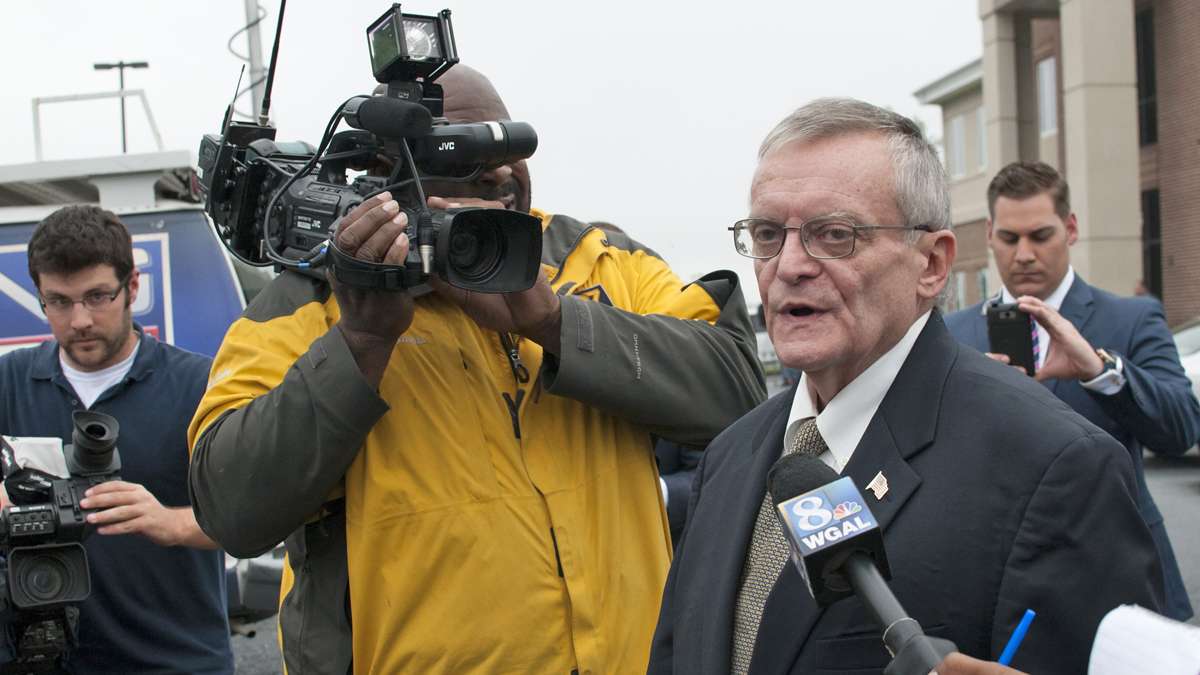Capital city corruption case heading back to court

In this file photo, former Harrisburg Mayor Stephen Reed talks to reporters after his arrest on theft, bribery, corruption and other charges. (Diana Robinson/WITF)
Former Mayor Stephen Reed remains the only person charged in the state Attorney General’s office investigation into Harrisburg’s financial mess.
Videos, audit reports and news stories document the wide-ranging dysfunction responsible for the city’s fiscal crisis. It ensnares many people, in multiple levels of government and the private sector.
Some of them will be charged, at least that’s what embattled Pennsylvania Attorney General Kathleen Kane promised. That was almost six months ago.
In the meantime, Kane’s own drama has snowballed. The Harrisburg case changed hands after the office lost the former deputy handling it. And no other arrests have been made, even though those close to the investigation say the fallout’s far from over.
Reed’s case is heading to trial, though. He’s due back in court Jan. 6.
The case
Reed, 64, was arrested in July on bribery, theft, corruption and other charges.
The arrest continued his fall from grace that started with a failed bid for an eighth term as mayor of the capital city.
Reed had been in office, at that point, for nearly 40 years. He won a seat in the state House at 25 years old, and followed a term there with one as a Dauphin County Commissioner before taking the mayor’s office.
For much of that time, Reed had a reputation as a visionary, and a power broker.
But as he left office, the recession peaked, and the city realized it couldn’t make payments on its debt.
The tab? Nearly half a billion dollars.
“They turned the bond system into a visa card. You get an offer in the mail, max that out to pay the other one, and it just kept getting bigger and bigger,” says City Solicitor Neil Grover.
Years ago, Grover, along with current Mayor Eric Papenfuse, founded watchdog group Debt Watch Harrisburg.
Grover estimates the city paid about $50 million to professionals for help on financial deals that proved disastrous.
“There are law firms, finance firms. There are developers. There are people that frankly had worked for Mr. Reed who went out to the private sector during his tenure, and made money off those connections,” Grover says.
The crisis sparked investigations by multiple law enforcement agencies and led to the state’s first and only local government takeover.
The city’s finances are in better shape now — but people face higher utility bills, and aggressive, costly parking enforcement.
Reed maintains he only ever acted to benefit the city.
“I believe very strongly that all of this started in a reverse order, that a conclusion was made to go after Reed and then send people out to find something to throw in there,” Reed said in September.
The 449 counts against Reed center on his allegedly taking artifacts bought with public money to fill museums that never opened.
Thousands of the objects were paraded out of Reed’s house by investigators last summer.
But Reed’s lawyers say their client bought most, if not all, of the items at past city auctions or private sale.
Former Deputy Attorney General Clarke Madden later side-stepped questions about whether his team ruled that out.
“That’s not a question…as we discussed in the courtroom, that’s not something that’s at issue here today,” Madden said in September.
Reed’s team also argues the statute of limitations has expired on many charges.
They’re hoping Judge Kevin Hess rules Jan. 6 on their petition to toss those charges, and a separate decision that would force the city to turn over public documents, which Reed’s lawyer Henry Hockeimer says he needs to defend his client.
Hess is the retiring president judge in Cumberland County. Judges from outside Dauphin County have handled the case thus far to avoid any conflicts of interest. Cumberland’s right across the Susquehanna River, though. Richard Cashman, a district magistrate from Columbia County, 50 miles away, presided over the preliminary hearing.
WHYY is your source for fact-based, in-depth journalism and information. As a nonprofit organization, we rely on financial support from readers like you. Please give today.



